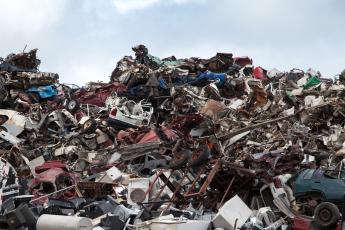Related Topics
Philadelphia Politics
Originally, politics had to do with the Proprietors, then the immigrants, then the King of England, then the establishment of the nation. Philadelphia first perfected the big-city political machine, which centers on bulk payments from utilities to the boss politician rather than small graft payments to individual office holders. More efficient that way.
Philadelphia Economics
economics
Nature Preservation
Nature preservation and nature destruction are different parts of an eternal process.
New Jersey (State of)
 The Garden State really has two different states of mind. The motto is Liberty and Prosperity.
The Garden State really has two different states of mind. The motto is Liberty and Prosperity.
Right Angle Club 2008
A report, to the year 2008 shareholders of the Right Angle Club of Philadelphia, by the outgoing president, Neale Bringhurst...
Detroit Makes, Philadelphia Takes

|
| Junk Yard |
Let's look at the economics of a junkyard in a business-school way. Derelict auto bodies worth $80 a ton at current prices can be profitably converted into $235 worth of scrap metal, provided the cost of doing so can be kept below $155 a ton. The Camden Iron and Metal company are able to do so for $115 in expenses, and so reaps a profit of $40 a ton. That's not to mention the relief the owner of a useless car feels when the derelict hulk is taken off his hands, or the relief the City feels in ridding itself of thousands of vehicles abandoned in various alleys and public places. Or the worth to the steel mills of being able to produce new metal at a reduced price compared with starting with iron ore and limestone. Or the benefit to our balance of trade from being able to export the motor blocks and transmissions salvaged intact from the wrecks, leading to foreign motor cars of a quality that may, or may not, withstand impartial examination..
Camden Iron and Metal, Inc. is crawling with engineers who help cope with the currently dwindling steel content of contemporary autos, and the consequent increase in non-ferrous metals, glass, plastic and whatever. The most profitable component of the salvage company thus lies in a subsidiary, Innovative Recycling Products, Inc. The copper content of scrap used to be a headache, but is now a revenue center, for example. There once was a time when scrap iron was chopped up and buried in landfills. Nowadays, people are getting rich digging up such landfills and mining the scrap metal. There are other problems you probably wouldn't imagine, such as the disagreeable discovery that lots of those crushed auto bodies have dead dogs locked in their trunks.
It's big business, where a single crane, of which this company has a great many, costs $1 million, and the grinding mills and purifiers cost much more, last only a year, and must be maintained or replaced. There is an increasing plastic content in cars, so that stuff is ground up, pulverized, and burned to produce energy to run the shredding operation. Trucks bringing in a scrap for processing typically run all night on the highways, which reduces the public profile of the salvage operation but increases its 24-hour efficiency. When metal is torn apart, internal friction creates 2000 degree heat, cooled by water, producing huge clouds of steam. The closing of the Bessemer Steel Works reduced the local market for scrap steel, prompting more exports of scrap, and stimulating more search for ways to salvage other ingredients of the scrap. Increasingly, the purification of the raw material has thrust the scrap processors into the role of a pre-processing step in the steel industry. Just as slaughterhouses used to boast of using all of the pig except the squeal, hardly anything is now left of the bodies of discarded autos except for the unattractive scrap heap. Hey, if every housewife admires the idea of household recycling, maybe they can grow to love auto body recyclers.
And then, friends, this is Philadelphia so politics enters in. It has come in the form of visits from the Governor who wants the shredder to move to the waterfront, but who also has a struggle with New Jersey over dredging the river channel to balance in his mind. So, sometimes expensive relocation proposals are made, partially implemented, and then suddenly abandoned for reasons best known in Harrisburg and Trenton. It's conjectured that a central issue in this scrap iron struggle is the high price charged for electric power by New Jersey utility monopolies, tending to drive the scrap salvagers over to Pennsylvania. Since macing utilities is a central feature of modern urban political financing, it's equally possible that Pennsylvania power is produced at a subsidized loss in this struggle, or that New Jersey is concealing its tax burden within electric bills. One would have to know more facts to form an informed judgment, in a situation where facts are hard to come by.
Originally published: Friday, November 30, 2007; most-recently modified: Thursday, May 16, 2019
| Posted by: Irv Gerson | Dec 6, 2007 8:41 PM |